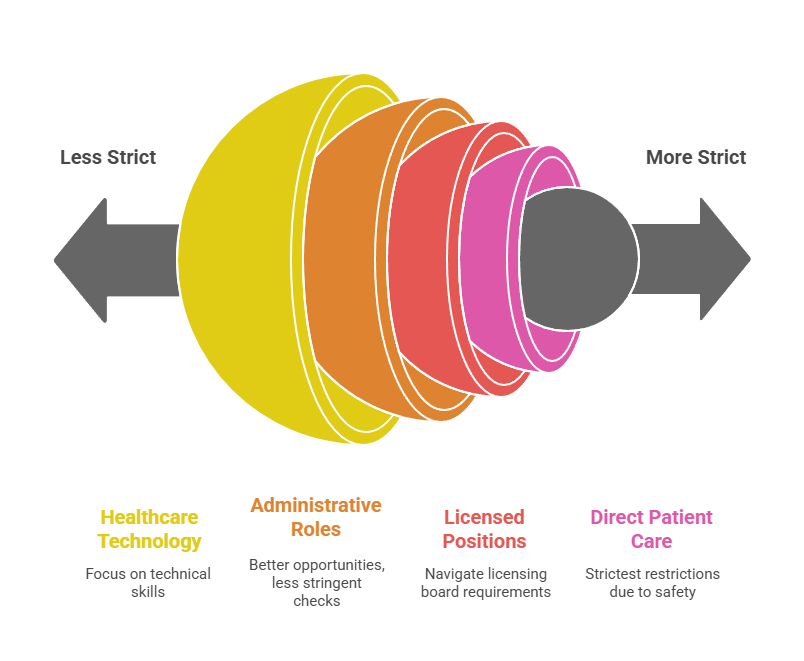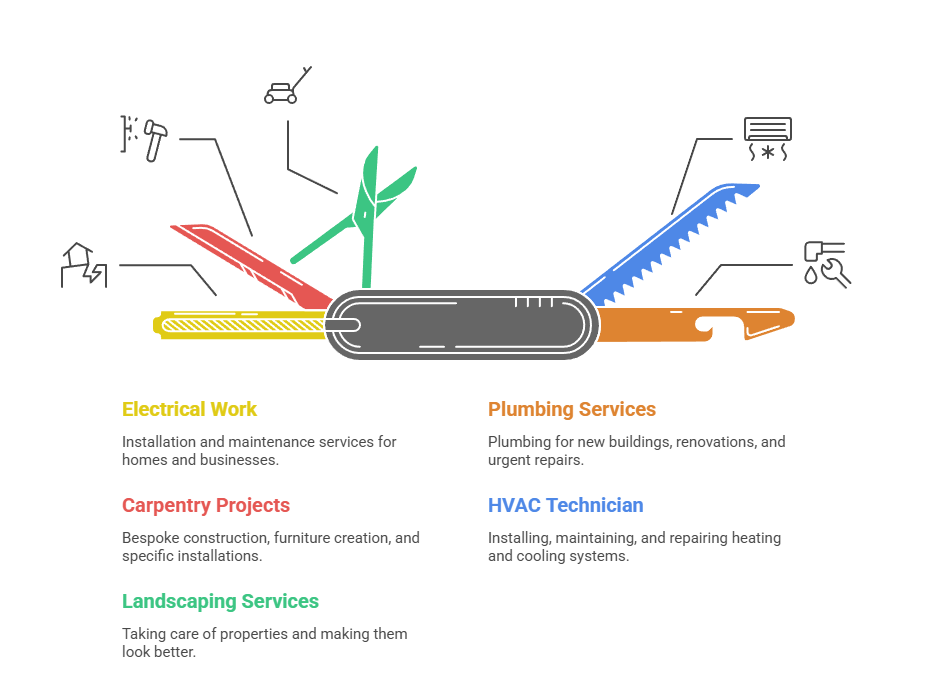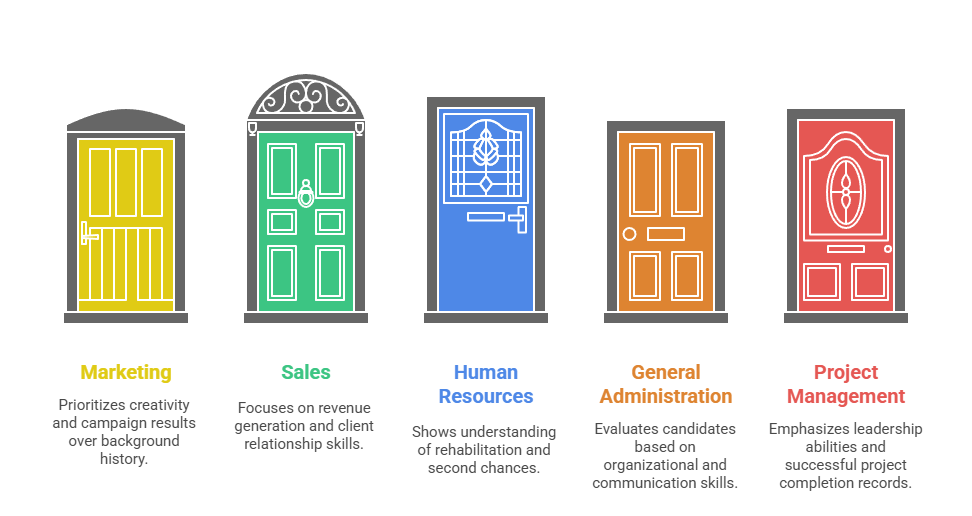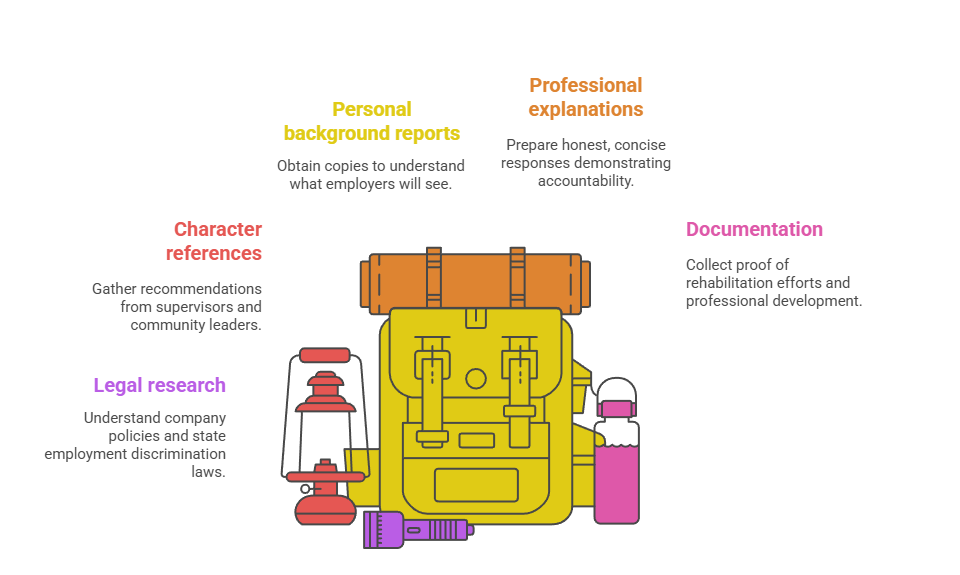DUI employment restrictions vary significantly across industries, with financial services, healthcare, and transportation sectors imposing the strictest limitations, while technology, retail, and many trade jobs offer more opportunities for applicants with DUI convictions. Understanding which industries conduct thorough background checks and employment screening processes can help job seekers with DUI records focus their efforts on sectors with higher acceptance rates and better employment prospects.
Key Takeaways
- High-restriction industries including banking, healthcare, education, and transportation typically disqualify candidates with DUI convictions due to regulatory requirements and safety concerns.
- Technology companies, retail businesses, and construction trades generally show more flexibility toward hiring individuals with DUI records, focusing primarily on job-relevant skills and experience.
- Employment screening processes vary by company size and industry, with larger corporations typically conducting more comprehensive background checks that include DUI convictions.
- Professional licensing boards in fields like law, medicine, and finance may impose additional restrictions or disciplinary actions for DUI convictions beyond employer hiring decisions.
- State laws and regulations create variations in DUI employment discrimination, with some states offering stronger protections for job applicants with criminal records.
- Disclosure timing and honesty during the application process significantly impact hiring outcomes, with many employers appreciating transparency about past DUI convictions.
Understanding DUI Impact on Employment Screening

DUI convictions appear on background checks and employment screening processes. They create barriers across various industries and career paths. The severity of these restrictions depends largely on job responsibilities, industry regulations, and company policies regarding criminal history. Modern background check processes have become increasingly sophisticated. This makes it nearly impossible to conceal DUI records from potential employers who conduct thorough screening.
Most employers perform background checks after extending conditional job offers. However, some industries require screening earlier in the process. The Fair Credit Reporting Act (FCRA) governs how employers can use background check information. It requires written consent and provides applicants with rights to dispute inaccurate information. Understanding these processes helps job seekers prepare appropriate responses. It also helps them target industries with more favorable hiring practices.
The timing of DUI convictions significantly affects employment outcomes. Recent convictions typically pose greater challenges than older ones. Many employers focus on patterns of behavior rather than isolated incidents. Therefore, applicants with single DUI convictions may face fewer restrictions than those with multiple offenses.
Industries With Strict DUI Employment Restrictions
Financial Services and Banking
Financial institutions maintain some of the strictest policies regarding DUI convictions. This occurs due to federal regulations and fiduciary responsibilities. Banks, credit unions, and investment firms often automatically disqualify applicants with recent DUI convictions.
| Position Type | Restriction Level | Typical Waiting Period |
| Bank Tellers | High | 5-7 years |
| Financial Advisors | Very High | 7-10 years |
| Loan Officers | High | 5-7 years |
| Investment Managers | Very High | 10+ years |
The Federal Deposit Insurance Corporation (FDIC) requires disclosure of criminal convictions. This makes employment in traditional banking extremely challenging.
Healthcare and Medical Fields
Healthcare organizations face significant liability concerns and regulatory oversight. This leads to strict hiring policies for applicants with DUI records. Hospitals, clinics, and medical practices worry about patient safety. They also consider professional licensing issues and potential legal exposure.

- Direct patient care roles: Face the strictest restrictions due to safety concerns and liability issues
- Licensed professional positions: Must navigate state licensing board requirements and potential disciplinary actions
- Administrative healthcare roles: Offer better opportunities with less stringent background requirements
- Healthcare technology positions: Focus more on technical skills than direct patient interaction
Many healthcare positions require professional licensing. State licensing boards often impose additional restrictions or monitoring requirements for DUI convictions.
Transportation and Logistics
Transportation industry restrictions on DUI convictions are among the most comprehensive. They are also the most logical given the direct connection between impaired driving and job performance. Commercial driving positions, aviation careers, and maritime jobs typically impose permanent disqualifications.
The Department of Transportation (DOT) maintains strict standards for commercial driver's license holders. They often require extended waiting periods and completion of substance abuse programs. However, logistics companies may still hire individuals with DUI records for warehouse roles. They also consider dispatch or administrative positions that don't involve vehicle operation.
Industries That Welcome Second-Chance Employment

Technology and Software Development
Technology companies frequently demonstrate flexibility regarding DUI convictions. They focus primarily on technical skills and innovation capabilities. Software development, cybersecurity, and IT support roles often prioritize demonstrated expertise.
| Tech Sector | Hiring Flexibility | Common Positions |
| Software Development | Very High | Developer, programmer, QA tester |
| Cybersecurity | High | Analyst, specialist, consultant |
| IT Support | High | Help desk, system administrator |
| Data Science | High | Analyst, scientist, engineer |
Startups and mid-sized technology firms typically conduct less intensive background screening. Remote work opportunities in the technology sector also reduce concerns about commuting reliability.
Construction and Skilled Trades
Construction companies and trade organizations generally show acceptance of workers with DUI convictions. They recognize that skilled labor shortages require practical hiring approaches. Electricians, plumbers, carpenters, and other trade professionals can often find employment despite background issues.

- Electrical work: Residential and commercial installation plus maintenance services
- Plumbing services: New construction, renovation, and emergency repair work
- Carpentry projects: Custom construction, furniture making, and specialized installations
- HVAC technician roles: System installation, maintenance, and repair services
- Landscaping services: Commercial and residential property care and improvements
These industries often prioritize hands-on skills and work reliability over background history. This makes them excellent options for individuals seeking stable employment after DUI convictions.
Retail and Hospitality Services
Retail businesses typically impose minimal restrictions on hiring individuals with DUI convictions. Department stores, specialty retailers, and e-commerce companies focus on customer service skills. They also value sales ability rather than driving history.
Many retail employers offer opportunities for advancement and skill development. This creates long-term career paths for dedicated employees. Customer service roles in various industries provide additional opportunities. This is particularly true for remote positions that eliminate transportation concerns entirely.
Professional Jobs and Corporate Employment Strategies
Corporate hiring practices vary significantly based on company size and industry sector. Large corporations typically conduct comprehensive background checks and employment screening. However, many maintain policies that consider the relevance and timing of criminal convictions. They avoid implementing blanket disqualifications whenever possible.

- Marketing departments: Often prioritize creativity and campaign results over background history
- Sales positions: Focus on revenue generation and client relationship skills
- Human resources roles: May show understanding of rehabilitation and second chances
- General administration: Typically evaluate candidates based on organizational and communication skills
- Project management: Emphasize leadership abilities and successful project completion records
Companies increasingly recognize the value of second-chance hiring. They also understand the potential legal risks of overly broad criminal history discrimination. Many organizations now evaluate DUI convictions on a case-by-case basis.
State Laws and Regional Employment Variations
Employment discrimination laws vary significantly across states. This creates regional differences in how employers can use DUI convictions in hiring decisions. Some states have implemented "ban the box" legislation. This delays criminal history inquiries until later in the hiring process.
| State Category | Protection Level | Key Features |
| Strong Protection | High | Ban the box, waiting periods, individualized assessment |
| Moderate Protection | Medium | Limited lookback periods, job relevance requirements |
| Minimal Protection | Low | Federal minimums, employer discretion maintained |
Understanding local laws and regulations helps job seekers identify geographic areas with favorable employment prospects. California, New York, and several other states have implemented comprehensive fair chance hiring laws. These laws restrict when and how employers can ask about criminal history.
Navigating Background Checks and Disclosure Requirements
Timing of Criminal History Disclosure
The timing of DUI disclosure significantly impacts hiring outcomes. Some applicants choose to address their criminal history proactively in cover letters. Others wait until specifically asked during the application process. Understanding company policies helps determine the best approach for each situation.
Many human resources professionals recommend honesty and transparency throughout the hiring process. They suggest preparing a brief, professional explanation of the circumstances. This explanation should focus on lessons learned and personal growth since the conviction.
Preparing for Background Check Results
Employers typically conduct background checks after extending conditional job offers. This timing allows candidates to demonstrate their qualifications first. It also provides opportunities to build rapport with hiring managers.

- Personal background reports: Obtain copies to understand what employers will see
- Professional explanations: Prepare honest, concise responses demonstrating accountability
- Character references: Gather recommendations from supervisors and community leaders
- Documentation: Collect proof of rehabilitation efforts and professional development
- Legal research: Understand company policies and state employment discrimination laws
When background check results reveal DUI convictions, prepared responses can help maintain candidacy. Key preparation strategies include these essential approaches.
Industry-Specific Licensing and Regulatory Challenges
Many professions require state licensing or professional certifications. These requirements often include character and fitness evaluations. DUI convictions can affect licensing applications and renewals. However, the impact varies significantly by profession and state jurisdiction.
Legal professionals face particularly strict scrutiny from state bar associations. Medical professionals must navigate state medical board requirements. Financial professionals deal with securities licensing authorities. Each regulatory body has different standards and procedures for evaluating criminal history.
Some licensing boards offer conditional licenses or monitoring programs. These allow professionals to work while demonstrating rehabilitation. Others impose waiting periods or require completion of specific programs. Understanding these requirements helps career planning and timeline expectations.
Alternative Career Paths and Entrepreneurship
Freelancing and Contract Work
Independent contracting and freelance work often provide alternatives to traditional employment screening. Many clients focus primarily on work quality and deliverables. They place less emphasis on background history and formal employment screening processes.
- Creative services: Writing, graphic design, photography, and marketing content creation
- Technical consulting: Web development, software programming, and IT system management
- Business services: Accounting, legal research, project management, and administrative support
- Specialized skills: Industry expertise, training, and professional consultation services
Building a strong portfolio and client base can eventually lead to business ownership opportunities. Freelance opportunities exist across numerous industries and skill levels.
Starting Your Own Business
Entrepreneurship eliminates employment screening barriers entirely. It also provides opportunities for unlimited income and career growth. Many individuals with DUI records find success in business ownership. They often excel because of their determination to overcome past challenges.
Small business opportunities span numerous industries and investment levels. Service businesses often require minimal startup capital but offer steady income potential. Retail operations need more investment but provide scalability options. Technology businesses can start small and grow rapidly with the right products or services.
Long-term Career Recovery and Professional Development
The long-term impact of DUI convictions on career prospects diminishes over time. This occurs particularly with demonstrated rehabilitation and consistent employment history. Many employers focus primarily on recent criminal activity. This makes older DUI convictions less relevant to hiring decisions in most situations.
Professional growth strategies help overcome initial barriers and build long-term success. Continuing education demonstrates commitment to self-improvement and career advancement. Industry certifications validate skills and knowledge in specific fields. Leadership roles in volunteer organizations showcase character and community involvement. Professional networking creates relationships that can lead to opportunities and recommendations.
Career counseling services specializing in criminal justice issues provide valuable guidance. They help with resume preparation, interview strategies, and industry targeting. Some organizations offer mentorship programs that connect job seekers with successful professionals. These resources significantly improve employment outcomes and career trajectories.
Employer Perspectives and Hiring Trends
Changing Corporate Attitudes
Modern employers increasingly recognize the business benefits of second-chance hiring. They understand that diverse hiring practices expand talent pools and improve workplace culture. Many companies have formal diversity and inclusion programs. These programs specifically address barriers faced by individuals with criminal history.
Research shows that employees with criminal backgrounds often demonstrate higher loyalty and work ethic. They also tend to have lower turnover rates compared to the general employee population. These findings encourage more employers to reconsider blanket restrictions on hiring individuals with DUI records.
Best Practices for Applicants
Successful job seeking with a DUI record requires strategic planning and professional presentation. Applicants should research target companies and understand their hiring practices. They should also prepare honest explanations that demonstrate accountability and growth.
| Strategy Category | Key Actions | Expected Outcomes |
| Professional Development | Certifications, training, education | Enhanced qualifications |
| Community Involvement | Volunteering, leadership roles | Character demonstration |
| Network Building | Industry connections, mentorship | Hidden job market access |
| Application Strategy | Targeted applications, honest disclosure | Higher success rates |
Professional development activities strengthen applications and demonstrate commitment to career success. Strong professional references provide third-party validation of work ethic and reliability. These elements combined create compelling candidacies despite past DUI convictions.
Conclusion
DUI employment restrictions create significant challenges but don't eliminate career opportunities across all industries and job types. Technology, construction, retail, and many other sectors offer viable employment options for individuals with DUI convictions. Meanwhile, heavily regulated industries like healthcare and finance impose stricter limitations. Understanding industry-specific hiring practices and employment screening processes helps job seekers focus their efforts on opportunities with higher success rates. With strategic planning, honest communication, and persistent effort, individuals can build successful careers despite past DUI convictions and overcome the initial barriers these records may create.
Frequently Asked Questions
Which industries are most likely to hire someone with a DUI?
Technology companies, construction and skilled trades, retail businesses, and customer service sectors typically show the most flexibility in hiring individuals with DUI convictions. These industries often prioritize relevant skills and experience over background history, making them excellent options for job seekers with DUI records.
What professional jobs can I get with a DUI conviction?
Professional opportunities include marketing, sales, business administration, software development, project management, and various consulting roles. Many corporate positions outside of heavily regulated industries consider DUI convictions on a case-by-case basis rather than implementing automatic disqualifications.
Do all employers check for DUI convictions during background screening?
Not all employers conduct comprehensive background checks, and policies vary significantly by company size and industry. Small businesses and startups often perform limited screening, while large corporations and regulated industries typically conduct thorough criminal history reviews including DUI convictions.
How long does a DUI affect employment opportunities?
The employment impact of DUI convictions generally decreases over time, with most employers focusing on recent criminal activity. After 5-7 years, many companies consider DUI convictions less relevant to hiring decisions, especially when candidates demonstrate consistent employment history and personal growth.
Can I be fired from my current job for getting a DUI?
Employment termination for DUI convictions depends on job requirements, company policies, and state laws. Positions requiring driving, professional licenses, or working with vulnerable populations face higher termination risks, while office workers and other roles may see minimal impact on current employment.
Are there legal protections against DUI employment discrimination?
Legal protections vary by state, with some jurisdictions implementing "ban the box" laws and restrictions on considering older convictions. However, federal law generally allows employers to consider criminal history, including DUI convictions, in hiring decisions when relevant to job requirements.
Additional Resources
- National Employment Law Project - Criminal Records and Employment Guide
https://www.nelp.org/criminal-records-employment-guide - Society for Human Resource Management - Background Screening Best Practices
https://www.shrm.org/background-screening-best-practices - Equal Employment Opportunity Commission - Criminal History Guidelines
https://www.eeoc.gov/criminal-history-guidelines-employers - American Bar Association - Collateral Consequences of Criminal Convictions
https://www.americanbar.org/collateral-consequences-criminal-convictions - National Institute of Justice - Employment After Prison Research
https://nij.ojp.gov/employment-after-prison-research - Department of Labor - Federal Bonding Program for Ex-Offenders
https://www.dol.gov/federal-bonding-program-ex-offenders - Legal Action Center - Employment Rights for People with Criminal Records
https://www.lac.org/employment-rights-criminal-records - National Conference of State Legislatures - Criminal Justice Database
https://www.ncsl.org/criminal-justice-database-employment
Still have questions?
Get in touch with our team today for a personalized demo and discover how our tailored volume pricing and packages can drive results for your business!
How useful was this page?*
Note: your comments are anonymous. We use them to improve the website. Do not include any personal details.
Visit our FCRA Compliance Tool or leave a message here if you need a response.
From the blog Explore the GCheck Content Hub

Employment Credit Checks: 2026 Guide to Legal Compliance and Best Practices
7 Jan, 2026 • 27 min read
I-9 Form Management Systems: Modernizing Employment Eligibility Verification for 2026
6 Jan, 2026 • 19 min read
EEOC Compliance Requirements 2026: Complete Employer Guide to Fair Hiring Practices
29 Dec, 2025 • 24 min readThe information provided in this article is for general informational and educational purposes only and should not be construed as legal advice or a substitute for consultation with qualified legal counsel. While we strive to ensure accuracy, employment screening laws and regulations—including but not limited to the Fair Credit Reporting Act (FCRA), Equal Employment Opportunity Commission (EEOC) guidelines, state and local ban-the-box laws, industry-specific requirements, and other applicable federal, state, and local statutes—are subject to frequent changes, varying interpretations, and jurisdiction-specific applications that may affect their implementation in your organization. Employers and screening decision-makers are solely responsible for ensuring their background check policies, procedures, and practices comply with all applicable laws and regulations relevant to their specific industry, location, and circumstances. We strongly recommend consulting with qualified employment law attorneys and compliance professionals before making hiring, tenant screening, or other decisions based on background check information.

